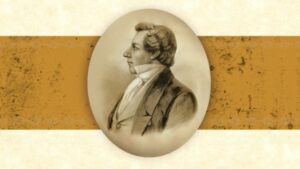For many, many years, even though I professed to have a testimony of Jesus Christ and his restored gospel, even though I went to church every Sunday and held “important” callings, even though I read my scriptures, had family home evening, and said my prayers, I faced the world alone. I’m not saying that the Lord was not with me, because now, looking back, I can see that He most certainly was. But I didn’t feel his presence, because I didn’t trust him. I didn’t rely on him. I didn’t rely on anyone. I thought it was just me against the vagaries of the universe. I was constantly braced for disaster. Never knowing what horrible thing lay just around the corner, my body was always tense, always on the verge of fight or flight. Such tension cannot be sustained for years by the human body without physical consequences.
There are many of us who have a terrible time with trust. Even though we profess to believe in Jesus Christ and Heavenly Father, that relationship is not seen as a trustworthy one. Bad things happen to good people. Abuse, divorce, natural disasters, illness, financial difficulties are but a few of the trials of mortality. Many of us who have been through these things have natural physical/psychological reactions that make us guarded, closed inside. We are natural men and women with natural responses to mortality. And yet there is that scary scripture in Mosiah 3:19 that says: “For the natural man is an enemy to God, and has been from the fall of Adam, and will be, forever and ever, unless he yields to the enticing of the Holy Spirit, and putteth off the natural man and becometh a saint through the atonement of Christ the Lord, and becometh as a child, submissive, meek, humble, patient, pull of love, willing to submit to all things which the Lord seeth fit to inflict upon him, even as a child doth submit to his Father.”
I don’t know about you, but when King Benjamin talks about submission in all things, it used to scare me to death. That’s just what I was afraid of. I wasn’t going down without a fight! Being a child was not a pleasant experience for me at all and I wasn’t going back there. I was going to have control over my life!
But mortality is a teacher, and the longer we live, the more we find out that if anyone has control, it surely isn’t us! So the day comes when we have to take King Benjamin seriously. Are we an enemy to God? Do we see him as an enemy to us-causing calamity in our lives? Do we keep a shield up, saying “This far and no further”? I don’t think most of us would consider ourselves enemies to God. But, when we react as natural men and women to the calamities of mortality, we are not yielding to the enticing of the Holy Spirit. We are spiritually sitting in a hole in the ground and eating beans.
This life isn’t just about enduring, it’s about becoming.
Do we want to get out of that hole? Where is our ladder? King Benjamin tells us. It is the atonement of Christ. We become a saint through the atonement of Christ. Okay. That’s our ladder. How do we use it? Elder Bednar gives us some clues in his address “In the Strength of the Lord.” He first addresses the redeeming power of the atonement, with which most of us are familiar. But we are not talking about sin here. In this hypothetical situation, we are assuming that we are repentant victims of worldly sorrows. We are in the hole because we are scared.
Elder Bednar says, “I suspect that you and I are much more familiar with the nature of the redeeming power of the Atonement than we are with the enabling power of the Atonement. It is one thing to know that Jesus Christ came to earth to die for us. That is fundamental and foundational to the doctrine of Christ. But we also need to appreciate that the Lord desires, through His Atonement and by the power of the Holy Ghost, to live in us-not only to direct us but also to empower us. . . I am not so sure, however, that we know and understand that the Atonement is also for saints-for good men and women who are obedient and worthy and conscientious and who are striving to become better and serve more faithfully. I frankly do not think many of us “get it” concerning this enabling and strengthening aspect of the Atonement, and I wonder if we mistakenly believe we must make the journey from good to better and become a saint all by ourselves through sheer grit, willpower, and discipline, and with our obviously limited capacities.” (“In the Strength of the Lord”, David A. Bednar, Devotional Address, BYU, 23 Oct 2001).
So we have a ladder and that is the Atonement. And through that Atonement we have the means to climb that ladder. We can get out of our hole where we have been sitting alone and damaged, by using the enabling power of the Atonement.
Exactly how does this work? How do we go from a traumatized, fragile human being to a saint with the strength to climb the ladder? First, we have to lose the attitude. Elder Scott says, “Clearly, it is what you do and what you think about that determine what you are and what you will become.” (“The Sustaining Power of Faith in Times of Uncertainty and Testing,” Liahona, May, 2003.) Are we going to become angry human beings with chips on our shoulders for the rest of our lives? Where is that going to get us? Not out of the hole.
We are already broken. Do we have a contrite spirit? That’s the hard part. Total submission is never, ever easy. It wasn’t even easy for the Savior, who prayed in the Garden for the cup to pass from him. But we have been promised by Elder Bednar that we can become saints through the enabling power of the Atonement. On our own, as natural men and women we can’t be submissive. But by studying and praying we can learn contrition. As we repent of our attitude, as we realize how very much we owe our Savior, as we understand how much he suffered for not only our sins but the very sorrows that have us bowed down, we will be brought low in contrition. We will realize that it was a fallacy to ever think that we could stop whatever earthly tsunami brought us low. But as Elder Holland says, “Christ knows the way because he is the way.” (“Broken Things to Mend,” Ensign, May, 2006) “He is the way out and He is the way up.”
Our broken heart and contrite spirit are the requirements for stepping onto that most holy of ladders. As we climb, ever closer to the Lord, we will be faced with more trials, but if we seek the Lord, he will hold our hand and comfort us through them. We will not be facing the world alone. In the aforementioned article, Elder Scott says of this climb, “You need to ponder, pray, and exercise faith to willingly make choices consistent with the teachings of the Master. Such choices are made with trust in things that are believed and when acted upon will be confirmed. [Thus redeeming us from our “trust issues”] Only enough guidance is given to lead you aright and not to weaken your growing character.
That guidance will solidify your trust in Heavenly Father and the Savior.”
When I placed myself on the altar and finally sacrificed my last shred of will, it was in order to save my life. I gave my life to the Lord. He has done unbelievable things with it. As I climb my ladder out of my deep, dark hole, I find that I am very glad I’ve given up beans! There is a banquet spread for me. A banquet of opportunities.
The world is still a trying place. But I have a child’s delight now in the simple and beautiful things of the earth. In the chance to help and lift another. In the love of friends and family. In the opportunity to develop and refine my talents. In the sure, warm knowledge that I have a Savior who is my friend, who travels with me over treacherous seas.
If you haven’t done so, I would advise you most lovingly to submit yourself to the Savior as a child to his parent. The climb up and out is more than worth it.
G.G. Vandagriff is the author of twelve books, including The Only Way to Paradise and Deliverance from Depression. She loves to have visitors to her website

















